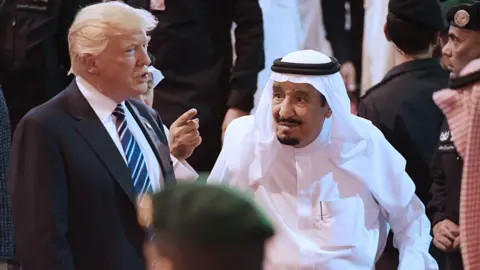Trumplomacy: Four takeaways from Trump's Cuba policy
 Getty Images
Getty ImagesThis is a rollback, not a reversal, of Obama's Cuba policy.
In the main, it is a gift to the old guard Cuban Americans in Miami who opposed the detente and voted for Trump.
So it bans financial transactions with the commercial arm of Cuba's military. But it also takes into account objections from US businesses that don't want to turn the clock back.
Thus, it does not "disrupt" existing joint ventures and carves out other exceptions. Probably the most visible effect will be a slowdown of American visitors, who took advantage of looser travel rules that Trump says he'll now strictly enforce.
Here are some takeaways:
1. Human rights - really?
President Trump framed his policy in the human rights concerns of his Miami constituency, which passionately opposes the Cuban government's ongoing repression of political freedoms.
And it bears the stamp of hawkish Cuban-American lawmakers such as Senator Marco Rubio, who see Obama's historic opening as an appeasement of the Castro regime.
But Trump's critics question why he singled out Cuba for such treatment when he's made a point of not lecturing other nations such as Saudi Arabia and the Philippines for bad behaviour.
"I welcome the administration bringing up human rights globally, but [Trump shouldn't] use it as an excuse to carry out a more extreme political agenda," Democratic Senator Ben Cardin told me.
Aside from the president's determination to fulfil a campaign promise to Miami, many Democrats believe he's simply bent on reversing Obama's signature policies.
 Getty Images
Getty Images2. Same solution, different strategies
Everyone agrees that a flourishing Cuban private sector is the key to political change. The disagreement is how to encourage it. Trump's policy promises to channel funds away from the Communist state and to the people who, says Mr Rubio, will in the long-term create a Cuban business class independent of the government.
US Secretary of State Rex Tillerson says it's a matter of law - he told a recent Senate hearing that the administration believes it's illegal for the US to provide financial support to the Cuban regime.
Pro-engagement advocates think that doesn't make any sense in a country where the authorities control so much of the economy. They fear this approach will ultimately stifle what private enterprise has managed to benefit from rapprochement.
3. Same frustration, different responses
However, there is frustration across the political spectrum that detente has done little to trigger political and economic reform in Cuba.
When he was secretary of state, John Kerry's people used to give us charts outlining what they called the "internal embargo" - ways the Cuban government could but didn't make the most of America's economic opening.
According to Republican Senator Bob Corker: "It's almost like it's engrained in them that whatever it is the US wishes for them to do, they are not going to do, just to demonstrate that the revolution is still alive."
It's probably true that these aging Communist rebels have resistance hard-wired in their DNA, after decades of defining their nationalism in opposition to American overt and covert intervention.
Obama decided to take the American "bad-guy" out of the equation. Trump's moves may put it back in, and return Cuban hardliners to their comfort zone.
4. New/old adversaries
Trump's team certainly wants to put pressure back into the equation - Mr Tillerson said the opening to Cuba had removed Havana's incentive to change and Washington's ability to force the issue.
But Cuba's leaders don't respond well to such treatment - they've made very clear they will not let outsiders push them into making political reforms.
Alongside their denunciation of the new measures, they did repeat their willingness to continue "respectful" dialogue and co-operation. But they won't have taken kindly to Trump's blistering take-down of a "cruel and brutal" Communist regime that's committed "terrible crimes in service of a depraved ideology".
Whatever the practical economic consequences of this new/old policy, it could well reinstate the adversarial relationship Obama sought to transform.

